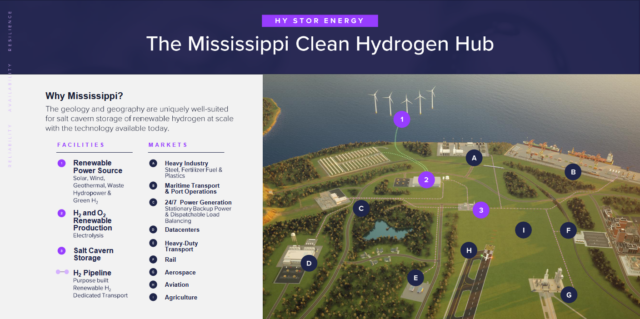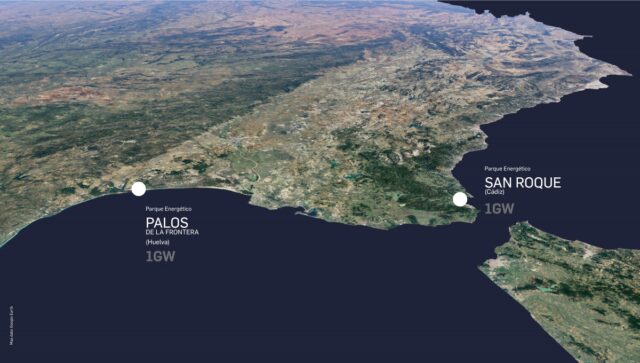Hy Stor & Nel: electrolyser supply for Mississippi-based renewable hydrogen
By Geofrey Njovu on May 16, 2024
Electrolyser manufacturer Nel ASA has reached an agreement to supply over 1 GW of alkaline electrolyser capacity for the Mississippi Clean Hydrogen Hub (MCHH) project.

Click to learn more. The MCHH will leverage Mississippi’s resources including renewable energy, infrastructure and geography to produce Green Hydrogen Standard 2.0 compliant hydrogen. From Claire Behar, Global Market Reach (Nov 2023).
Part of Hy Stor Energy’s portfolio, MCHH is a large, off-grid renewable hydrogen production and salt cavern storage hub to be located in Mississippi, USA. The project will leverage the region’s geography featuring underground salt formations, the Mississippi River, abundant solar & wind energy, and existing infrastructure including interstate road and railway transport and deep water port terminals, supplemented by favourable policies.
According to Hy Stor, the hydrogen produced at MCHH will be compatible with the Green Hydrogen Standard 2.0, meeting all requirements for import into the EU market. The standard regards “green” hydrogen as “electrolytically produced hydrogen which releases less than 1 kg of CO2-equivalent per kg of hydrogen.”
Subject to FID, electrolyser production is expected to occur between 2025 and early H1 2027 at Nel’s existing plant in Herøya, Norway. Nel will also provide FEED services for the electrolyser facilities at MCHH, with the two parties signing a contract in December last year. Nel will be the exclusive electrolyser partner for the project’s first phase, supplying both alkaline and PEM electrolysers.
Although the tonnage of hydrogen to be produced is unclear at this stage, Hy Stor has a letter of intent (LoI) in place to supply part of it to which will see part of it to steelmaker SSAB to be used for green steel production in Perry County, Mississippi.
We are thrilled to partner with Hy Stor Energy on the Mississippi Clean Hydrogen Hub. This project can enable significant carbon emission reductions and leave in its wake a blueprint for successful, large-scale green hydrogen projects.
Without ambitious pioneers, decarbonization at scale will not happen. Pioneers aim to do today what most people say can’t be done in years. To me, Hy Stor Energy is such a bold pioneer, and it makes me proud that the company has chosen Nel as its electrolyser partner on this game-changing project.
Håkon Volldal, Nel President and CEO, Globenewswire, 26 April 2024
Nel Hydrogen has proven electrolyser technologies and an automated manufacturing capability that fit perfectly with Hy Stor Energy’s plans to produce and deliver green hydrogen reliably and cost-effectively.
Trailblazing the development of the green hydrogen economy will require innovation and collaboration among industry first movers, and Hy Stor Energy is leading the charge in the production, storage and delivery of green hydrogen for emission-free manufacturing, transportation, and energy solutions. By pairing Nel’s technology with the Mississippi Clean Hydrogen Hub project, we’re ready to deliver tangible results for our customers.
Laura L. Luce, CEO and Founder of Hy Stor Energy, Globenewswire, 26 April 2026
Cepsa, Allied Green Ammonia pick electrolyser providers

Click to learn more. Cepsa’s Andalusian Green Hydrogen Valley will feature energy parks at San Roque and La Rábida. Cepsa has selected thyssenkrupp nucera and Siemens to provide electrolysers for the first phase of the La Rábida energy park. Source: Cepsa.
In other electrolyser news, two project developers have selected technology providers for the first phases of their ammonia projects. In Spain, energy giant Cepsa has chosen two organisations to provide electrolysers for its energy park in La Rábida, which it is developing in partnership with Fertiberia. thyssenkrupp nucera will provide 300 MW total of alkaline electrolysers, comprising 15 of its proprietary scalum® units, with a capacity of 20 MW each. scalum® units with a total capacity of more than 700 MW are also being employed at the H2 Green Steel project in Sweden.
The other 100 MW of electrolyser capacity at the La Rábida energy park will be supplied by Siemens (PEM units). This reflects Cepsa’s “multi-supplier, multi-technology” approach to creating a value chain for renewable hydrogen.
In Australia, Allied Green Ammonia have partnered with Plug Power for the supply of 3 GW of PEM electrolysers for AGA’s renewable ammonia project in Northern Territory, Australia. FID on the project is expected by the end of 2025, with electrolyser deliveries to begin in 2027.